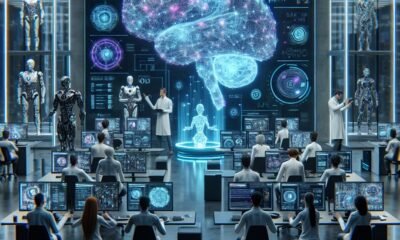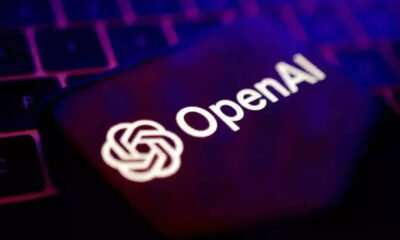Education
Education 5.0: AI and personalized learning drive the future of learning

The rapid rise of artificial intelligence (AI) and immersive digital tools is reshaping the foundations of modern education, demanding urgent strategic reform to prepare Generation Alpha for a technology-driven future.
Researchers have mapped this educational shift in a study titled “Education Strategy for the Net Generation”, published in Information. The paper calls for a complete overhaul of conventional teaching practices, outlining a new pedagogical model to align learning with the dynamic realities of the digital and generative AI eras.
The shift from digital to generative pedagogy
The research positions the evolution of education within a broad historical and technological framework, explaining how learning models must keep pace with societal and digital transformations. The authors describe how the transition from Web 2.0 to Web 4.0, combined with the rise of generative AI (GAI), large language models (LLMs), and immersive technologies like AR, VR, and IoT, has ushered education into a new era – Education 5.0.
Education 4.0, driven largely by digital pedagogy and the integration of online platforms, was sufficient for the early 21st century but no longer meets the needs of learners shaped by hyper-connectivity and intelligent systems. Generation Alpha, those born between 2010 and 2024, are fundamentally different from previous generations, acquiring information in complex, dynamic ways and demanding new teaching approaches that merge human intelligence with advanced technological tools. According to the authors, Education 5.0 is not just an incremental improvement; it represents a paradigm shift toward generative pedagogy, a hybrid system combining symbolic cognitive methods with AI-powered connectionist approaches.
This new framework emphasizes personalized learning paths, real-time feedback loops, and collaborative, interdisciplinary environments. Teachers, once positioned as transmitters of knowledge, must now act as mentors and interpreters, guiding students through the complexities of human–machine interaction. The model calls for cultivating not only cognitive skills but also emotional and ethical intelligence, ensuring that students remain critically aware and human-centered in a digital landscape increasingly mediated by AI.
Personalization, feedback, and collaboration in Education 5.0
Generative pedagogy harnesses the power of AI, machine learning, and big data to enhance the learning process. Adaptive platforms analyze student performance and behavior to create individualized learning experiences, ensuring that content delivery aligns with personal learning styles and needs. This hyper-personalization marks a significant departure from the one-size-fits-all approach that defined traditional education.
Real-time feedback has also emerged as a defining characteristic of Education 5.0. AI-powered systems, such as chatbots and smart tutors, are capable of instantly assessing student progress, providing immediate insights, and adjusting learning pathways in response to performance metrics. By integrating sensor technologies like eye-tracking and facial recognition, these systems can measure engagement and attention, offering educators actionable data to refine teaching methods and optimize outcomes.
Collaboration, a cornerstone of contemporary pedagogy, is also being transformed. The research highlights how digital platforms now enable interactive and collaborative learning spaces that transcend geographical barriers. These systems facilitate group discussions, joint projects, and peer-to-peer learning, fostering an environment where knowledge creation becomes a shared, participatory process. The integration of immersive technologies, such as extended reality and virtual environments, further supports active learning and deep engagement, ensuring students are not passive recipients of information but active co-creators of knowledge.
A case study within the research demonstrates how these concepts can be practically applied. In a vocational robotics program, students engaged in immersive digital classrooms that combined traditional teaching methods with VR-enhanced learning modules. The results were compelling: the experimental group outperformed the control group in task completion, demonstrated higher levels of motivation, and achieved better retention of complex concepts. This evidence reinforces the potential of generative pedagogy to enhance both technical proficiency and critical thinking in real-world educational settings.
Challenges, implications, and the road ahead
The study acknowledges significant resistance within educational institutions. Many educators remain skeptical, echoing earlier skepticism during the advent of digital tools, while others express concern over the reliability and ethical implications of AI systems. The rapid pace of technological evolution has also created a gap between industry capabilities and classroom realities, with schools often lagging behind in adopting and integrating cutting-edge innovations.
The authors argue that this resistance underscores the need for a balanced, critically informed approach to integrating AI into education. Generative AI, while powerful, is not infallible. It can produce errors, perpetuate biases, and generate misleading outputs, making critical engagement an essential component of modern learning. Students must be taught to treat AI as a partner rather than an unquestioned authority, applying rigorous sensemaking and analytical skills to every interaction.
The paper calls for redefining teachers’ roles in a hybrid human–machine learning environment. They will no longer be the sole arbiters of knowledge but will function as co-navigators, helping students critically navigate AI-mediated information ecosystems. This shift requires educators to adopt reflective practices and maintain a commitment to pedagogical integrity, ensuring that technology enhances rather than diminishes the human essence of education.
Education
Back 2 School: Local districts experimenting with AI learning tools in the classroom – WGRZ
Education
The Need for AI Literacy in Indian Legal Education

Artificial Intelligence (AI) is revolutionizing the contemporary landscape, harnessing the power of vast datasets to automate complex tasks and deliver tailored solutions. This transformative technology is reshaping our approach to longstanding challenges. India is at the leading edge of this AI evolution, ready to use the rapid technological progress to achieve remarkable growth in technology.
Legal education serves as the cornerstone for promoting social justice, equity, and a robust democracy, providing individuals with the expertise to navigate a society regulated by law. To accomplish this objective, society must cultivate proficient lawyers who serve essential functions within their communities. This necessitates a comprehensive framework that enables legal practitioners to address the changing demands of Indian society.
The obstacles presented by globalization, rising expenses, and ongoing judicial delays highlight the urgent necessity for technological advancement in the legal field. India’s dedication to Sustainable Development Goal 4 (SDG4) established in 2015, which prioritizes accessible and equitable quality education, corresponds with the National Education Policy 2020s objective to modernize legal education. By embracing global norms and new methodologies, the legal industry may markedly improve access to justice, safeguarding it as a fundamental right for all individuals.
After India’s independence in 1947, education was vital in fulfilling the moral needs of the newly liberated population. And, the main goal of the legal system was to realize the Constitution’s objectives, leading to the enactment of various laws for social reform, such as the Dowry Prohibition Act (1961) and the Hindu Marriage Act (1955). Today, India’s educational aim is to create a fair and just society. The Indian court system is struggling with a backlog of cases, corruption, and slow resolution times. The Supreme Court highlighted the importance of improving legal education to tackle these challenges and adapt to new global trends, advocating for the use of AI in the courts.
India’s current legal education and research framework is based on the common law tradition, and emphasizes upon critical thinking, teaching using Socratic methods, legal writing skills, oral advocacy, risk aversion, issue identification, and legal ethics. Although, these strategies have shaped generations of competent lawyers, yet they are now regarded as insufficient. Because, it places greater importance on theoretical understanding rather than on the practical abilities that are essential for contemporary legal practice. Lawyers are now anticipated to possess strong analytical skills and be proficient in utilizing legal technologies such as document automation and predictive analytics.
The expectations for newly graduated lawyers have changed considerably. They are now required to have robust technological skills, adaptability, and the capability to work alongside professionals from different fields, in addition to their conventional responsibilities in legal research and advocacy. Clients today look for legal professionals who can serve as strategic partners, grasping the connections between law, technology, and business. In this context, it is crucial for legal educators to integrate frameworks that align technical comprehension of AI with ethical and practical training. This method guarantees that students are prepared not just to use AI tools, but also to evaluate their results critically.
Consequently, the traditional method of legal education requires the implementation of more flexible and tailored curricula to tackle the growing complexities of legal matters in a rapidly globalizing and digital environment.
There is a notable trend towards incorporating AI literacy in various legal fields, prompting many law schools worldwide to either introduce or revise their AI courses introducing new courses centred around AI, such as Programming for Lawyers, AI Ethics and Privacy, AI and Experiential Learning etc. The National Law University of India in Bengaluru, OP Jindal University in Sonipat, and the Rajiv Gandhi School of Intellectual Property Rights in IIT Kharagpur have incorporated AI-focused courses into their curriculum. This initiative aims to equip students with the skills to utilize AI tools, addressing the technological needs of the profession, also understanding AI technologies can improve their job security and enhance their competitiveness in an ever evolving industry. Legal firms and experienced lawyers may expect younger associates to leverage generative AI technologies, given their familiarity with the changing tech landscape. AI will not replace lawyers; instead, those who adopt AI will likely excel over those who do not. An AI-focused curriculum can help cultivate lawyers who are less susceptible to being replaced. It is essential for students to not only learn how to use AI tools effectively but also to receive guidance on their optimal application.
While coding skills aren’t a requirement for lawyers but familiarize themselves with tools and platforms that are beneficial in the legal sector. Legal professionals can utilize these tools to streamline contract automation, conduct legal research, and monitor compliance effectively. This not only makes it easier to do analyses of vast datasets, automating complex tasks, providing customized solutions and uncover different interpretations of laws across jurisdictions, and can also assist judges with routine tasks which will allow them to focus on more complex issues.
The incorporation of AI into legal education is essential to meet the growing need for faster, more accurate, and accessible legal services. AI’s ability to perform tasks in seconds that traditionally take much longer necessitates a thorough overhaul of the legal curriculum to embrace digital advancements. Law schools in India are grappling with a pressing challenge such as outdated curriculum, many teachers are not well-versed in data science, machine learning, and artificial intelligence. This gap in knowledge, coupled with a resistance to shift from traditional teaching methods, hampers the integration of these technologies into legal education. Furthermore, the current infrastructure is inadequate for overseeing AI usage, as there are no clear guidelines for its proper application.
The Bar Council of India (BCI) is responsible for regulating legal education in India, established under the Advocates Act of 1961. The BCI’s primary role is to supervise the legal profession, ensuring lawyers adhere to professional conduct standards and safeguard the profession’s interests. Over time, the BCI’s mandate has expanded to include establishing standards for law colleges, including curriculum, infrastructure, faculty qualifications, and student admissions. This standardization ensures quality but limits the capacity of law schools to innovate and experiment with new approaches. Many law programs follow a strict curriculum, limiting opportunities for integrating innovative interdisciplinary subjects. The BCI has released a directive promoting the incorporation of subjects like blockchains, electronic discovery, cyber-security, robotics, artificial intelligence, and bio-ethics into curricula. However, law schools in India have neglected to integrate AI into their curricula, as the existing curriculum is extensive. Educators often shy away from integrating new technology in their classrooms due to the extra workload it entails. Even with access to labs and advanced tools, many schools struggle to deliver up-to-date, AI-enhanced learning materials. This gap arises from a lack of staff expertise in utilizing AI effectively, leaving students without the benefits of modern educational resources.
Ensuring digital inclusion is crucial for the sustainable integration of AI, as it ensures fair access to digital tools and resources for all students, regardless of their socioeconomic status or geographic location. Students enrolled in law colleges located in rural or semi-urban regions may experience a disadvantage in accessing technology and education in artificial intelligence relative to their metropolitan counterparts. Elite educational institutions and communities often have sophisticated digital infrastructures, such as high-speed internet, modern gadgets, and cloud computing resources, allowing them to adopt cutting-edge EdTech solutions.
Law schools in economically disadvantaged or rural regions encounter difficulties stemming from obsolete gear, unreliable internet connectivity, or a total absence of access to AI resources. The prevalence of AI materials and technologies in English constitutes a substantial obstacle to accessibility for non-English speaking students.
In addition to revising the curriculum to incorporate AI subjects, it is equally crucial to train the faculty and staff. This ensures that students are well-informed about the effective use of AI, fostering a sense of comfort and confidence. Such an approach is vital for achieving optimal outcomes in education and beyond.
Disclaimer
Views expressed above are the author’s own.
END OF ARTICLE
Education
First lady calls AI training a national responsibility for US students

First Lady Melania Trump has urged the nation’s business and technology leaders to back artificial intelligence (AI) education in schools, framing it as essential for preparing children for future jobs, reported India Today.
White House Task Force on AI education
Speaking at the inaugural meeting of the Artificial Intelligence Education Task Force, which she chairs, Trump balanced optimism with caution. “As leaders and parents, we must manage AI’s growth responsibly. During this primitive stage, it is our duty to treat AI as we would our own children — empowering, but with watchful guidance,” she said.
Education Secretary Linda McMahon joined the event, alongside Cabinet officials and industry leaders. Trump pressed the group to invest in AI training for schoolchildren, describing it as a national responsibility. “AI can be a powerful tool, but only if we teach our young people how to use it with wisdom,” she noted.
National contest and call for leadership
The First Lady also highlighted her recently launched nationwide contest for students in grades K–12, encouraging them to apply AI to projects or community challenges. She said the initiative is aimed at showcasing both the opportunities and limitations of the technology.
“America must lead in this field,” Trump told the gathering. “And leadership starts in our classrooms.”
-

 Business1 week ago
Business1 week agoThe Guardian view on Trump and the Fed: independence is no substitute for accountability | Editorial
-
Tools & Platforms4 weeks ago
Building Trust in Military AI Starts with Opening the Black Box – War on the Rocks
-

 Ethics & Policy1 month ago
Ethics & Policy1 month agoSDAIA Supports Saudi Arabia’s Leadership in Shaping Global AI Ethics, Policy, and Research – وكالة الأنباء السعودية
-

 Events & Conferences4 months ago
Events & Conferences4 months agoJourney to 1000 models: Scaling Instagram’s recommendation system
-

 Jobs & Careers2 months ago
Jobs & Careers2 months agoMumbai-based Perplexity Alternative Has 60k+ Users Without Funding
-

 Education2 months ago
Education2 months agoVEX Robotics launches AI-powered classroom robotics system
-

 Podcasts & Talks2 months ago
Podcasts & Talks2 months agoHappy 4th of July! 🎆 Made with Veo 3 in Gemini
-

 Funding & Business2 months ago
Funding & Business2 months agoKayak and Expedia race to build AI travel agents that turn social posts into itineraries
-

 Education2 months ago
Education2 months agoMacron says UK and France have duty to tackle illegal migration ‘with humanity, solidarity and firmness’ – UK politics live | Politics
-

 Podcasts & Talks2 months ago
Podcasts & Talks2 months agoOpenAI 🤝 @teamganassi






















